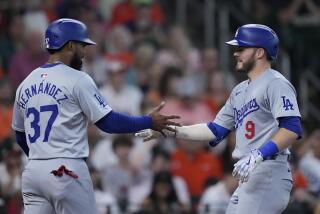Potential Dodger Bidders Stepping Up to the Plate
As the smoke began to clear Tuesday from Peter O’Malley’s bombshell announcement that his family is selling the Los Angeles Dodgers, the first potential bidders began to emerge for what is baseball’s--and arguably all of the sports world’s--premiere franchise.
Among those expressing concrete interest were former baseball Commissioner Peter Ueberroth, celebrity lawyer Robert Shapiro, and Robert Daly, co-chairman of the music and film divisions of Time Warner. Each said he would consider mounting a bid as part of a syndicate of wealthy investors.
Speculation in the sports and telecommunications industries, however, focused more on several entertainment companies that could incorporate ownership of the Dodgers into their broadcasting, cable or film production operations.
Heading that list is Los Angeles-based Fox Television, a unit of Rupert Murdoch’s News Corp. Fox TV broadcasts baseball nationally, and the Fox Sports West cable network will show Dodger games locally.
Murdoch, observers say, is an exceptionally aggressive bidder for properties he wants. He would be well-positioned to profit from Dodger telecasts on his other communications holdings, which include satellite broadcasting systems worldwide.
“If [buying the Dodgers] became part of the sports plan of Fox,” Ueberroth acknowledged, “Rupert Murdoch would more than likely be the successful bidder, in my view.”
Fox executives were unavailable for comment Tuesday.
Other entertainment companies mentioned as possible contenders are Sony, MCA, Viacom and ITT. Industry and corporate sources, however, downplayed the likelihood that any of those four might emerge as serious bidders.
Sony has not yet fully resolved its strategic and management problems at such entertainment units as Columbia Pictures. MCA’s new chairman, Edgar Bronfman Jr., is understood to oppose any investment in professional sports. Viacom is saddled with high levels of debt that might constrain its ability to make a Dodgers bid; indeed, the company recently sold its interest in the NBA’s New York Knicks and the NHL’s New York Rangers to ITT. And that company is said by internal sources to be uninterested in making a bid for the Dodgers.
The interest from individual investors and speculation about corporate buyers mixed with more fanciful ideas--such as a proposal by Brooklyn politicians to bring the team back to New York--as the sports world tried to digest O’Malley’s surprise announcement.
Most industry observers reached Tuesday said that the Dodgers’ great prestige as well as the team’s extensive real estate holdings in Los Angeles, Vero Beach, Fla., and the Dominican Republic could drive the sale price to the range of $300 million, a record for a major league baseball team.
That would put a purchase well out of the price range of any but the most well-heeled private investors or corporations that might exploit the team in ways that extend beyond the confines of Dodger Stadium.
“Our analysis would tell us this franchise will be sold for a record price,” said Ueberroth, who said he would consider making a bid even though the team “has a marquee value that would probably eliminate us because we are economic buyers.”
Daly agreed that private investors bidding for the team would have to understand that their money would earn a better return from more conventional investments. “As individuals, the only way to do it is if you really have the passion. In cold dollars and cents terms, you probably can’t get the return.”
Some observers say the high-end estimates of the Dodgers’ value depend on questionable assumptions about the value of the 300-acre Chavez Ravine parcel on which Dodger Stadium sits. The land, close to downtown Los Angeles, would have huge value if it could be developed commercially, but some real estate experts doubt that the land can be fully exploited.
“When they talked about putting an NFL stadium there, the local neighborhood was up in arms, saying there was too much congestion already,” said Richard Plummer of the real estate brokerage Cushman & Wakefield in Los Angeles.
Even assuming that the city would allow the site to be developed for something other than a ballpark, the cost of traffic mitigation measures such as widening roads would eat up most of the profits, Plummer added.
Nevertheless, the allure of the Dodgers name is hard to underestimate.
“It’s the most valuable baseball franchise there is,” said attorney Shapiro. “It’s a very, very interesting opportunity, perhaps the last of the great opportunities.”
Shapiro said he is discussing forming an investment group with several “individuals who can afford it, believe me.”
O’Malley said Tuesday that his phone was ringing off the hook all day, but that he has yet to respond to any inquiries or proposals. “We haven’t talked to anybody or listened to anybody yet.”
He did say that it is possible he would remain with the Dodgers in some capacity after the sale.
“Anything’s possible,” he told The Times. “It’s also possible that the new owner would want me to stay here. If that happened, chances are I wouldn’t turn them down. . . . I’m not going to go into hiding or go to a ranch in Montana or anything. If I could be of help, I would like to stay here.”
For all that, O’Malley’s announcement Monday underscored how radically the ownership of professional sports teams has changed since as recently as 1980, when as many as 10 major league teams were under family control.
Today, in the view of sports executives like San Francisco Giants chief operating officer Lawrence Baer, ownership is likely to fall into one of three categories:
One is corporate ownership, as with Walt Disney’s control of the Anaheim Angels, Tribune Co.’s ownership of the Chicago Cubs, and Time Warner’s ownership of the Atlanta Braves and the NBA’s Atlanta Hawks.
The second is groups of wealthy civic-minded individuals or companies, such as the Bay Area consortium that bought the Giants in 1992 or the group of Baltimore natives and locals--including film director Barry Levinson and author Tom Clancy--who purchased the Baltimore Orioles in 1993 for a record $173 million.
The third category is a combination of individual and public stock ownership, a structure recently pioneered by the Boston Celtics, which floated a public stock offering of 40% of the basketball club in 1986.
However, such stock sales are barred by baseball ownership rules. Beyond that, however, major league baseball has few ownership restrictions.
“They’re looking for people with sufficiently deep pockets--and they wouldn’t sell a team to the players,” says Henry J. Aaron, a Brookings Institution economist who participated in an owner-commissioned study of the sport’s economics in 1993.
Times staff writers Helene Elliott and Jean Merl contributed to this story.
* THE END OF AN ERA: The O’Malley name recalls capitalism’s more colorful days, says Robert A. Jones. B2
* BIG SHOES TO FILL: Peter O’Malley had to follow not one giant with the Dodgers but two. Roger Kahn’s story. C1
* WHY IS O’MALLEY SELLING? Because the business of sports has changed so much, says columnist James Flanigan. D1
More to Read
Go beyond the scoreboard
Get the latest on L.A.'s teams in the daily Sports Report newsletter.
You may occasionally receive promotional content from the Los Angeles Times.










